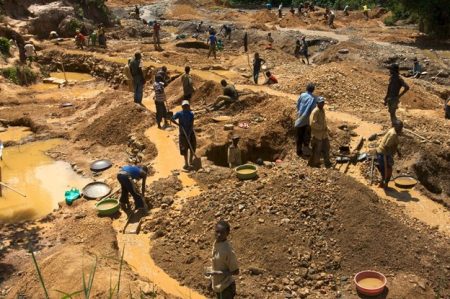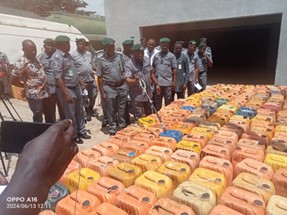 07 September 2014, Sweetcrude, Port Harcourt – The men walked into the Amakiri Family Hall, smiling nervously at each other and engaging themselves in meaningless banter. In no time visitors and hosts were throwing jokes happily across the table that divided them, Ebola, greedy doctors and the political demise of Governor Amaechi featuring prominently. Suddenly the bomb fell:
07 September 2014, Sweetcrude, Port Harcourt – The men walked into the Amakiri Family Hall, smiling nervously at each other and engaging themselves in meaningless banter. In no time visitors and hosts were throwing jokes happily across the table that divided them, Ebola, greedy doctors and the political demise of Governor Amaechi featuring prominently. Suddenly the bomb fell:
“What do you do for a living young man?”
The question was directed at the groom-to-be but it affected all the visitors, the hosts and the few spectators permitted into the purely private family business. The sweaty drinks, the freshly washed egg plants and the many platters of dry fish pepper soup all lost their allure. The hosts as though on cue all turned their malevolent eyes on the hunched figure that threw the bomb. The man, a lawyer who had not seen a courtroom for two months and lost earnings as a consequence was not bothered by the aggressive stares thrown in his direction,
“Yes?” he demanded further in a very careless manner.
“Em,” the young man started, “I dey do amnesty!”
“Amnesty, how does that work?”
“Sunny dey pay me, na me dey pay my boys.”
“Ah, who is Sunny?”
“You no know am? The amnesty Oga, Sunny Koko.” Of course he meant Sunny Kuku, Co-ordinator of the Amnesty Programme.
In 2003 the people of the Niger Delta rose up again in protest of their living conditions in the face of the wealth of the region which by legislation had become the commonwealth of all Nigerians. Their agitation was adjudged meaningful and justified by the international community, but not long, as most things Nigerian, the agitation was franchised, with non-indigenes of the region, criminals and “investors” buying stakes for material gain. It was a long, violent and intractable campaign that displaced populations in the Niger Delta, undermined governance and dislocated the process of the production of oil and gas, the very reason why the international community shut eyes and conscience to the democratic credentials of the struggle.
The problem was Obasanjo’s government to solve but that government, speckled by military philosophies, approached it militarily and failed to stem its growth. Enter Yar’Adua’s government. Somewhere within the government, a memo emanated: offer the militants amnesty within the facility of an ultimatum; provide the warlords and all their boys with monthly stipends UNTIL they have attended and taken advantage of skills acquisition programmes. NOTE please that this memo provided very little succour for the real agitators in the Niger Delta whose aspirations were to take control of the exploration and exploitation processes for oil and gas in order to regulate the health of their environment and to determine their economies independent of the interference of other states and the federal state.
The offer was acceptable to the criminals and “contractors” who had infiltrated the cause for gain. However, for reasons the federal government has not explained to Nigerians, the memo was re-drawn and misapplied to the extent that the warlords who refused to attend the federal government’s skills acquisition programmes and the boys and ghosts they purportedly commanded, are now on the payrolls and consequently, the perpetual recurrent budgets of the federal government like the army, the navy and the air force.
Amnesty was directed at genuine activists who had crossed the threshold of criminality in the process of their political agitations. Of course, government also hoped to rein in the core criminals responsible for several incidents of the disruption of production of oil and gas, the vandalism of oil pipelines, illegal oil bunkering and products refining, murders, rapes and kidnappings. Government also hoped to redirect their energies into skills for their benefits and for the benefit of the Nigerian state but policy implementation got mangled up so that the criminals who knew nothing about the a.b.c of the Niger Delta cause and those who were genuinely agitating for change in the oil and gas politics of Nigeria got into the ledgers of the federal government. The few who attended skills acquisition programmes still benefit from monthly stipends even after getting grants for equipment. In some cases, those who are actually deploying their newly acquired skills are still kept on the ledgers by their “commanders” who benefit from their monthly stipends without their knowledge. Add these to the many ghost entries that are imported into these lists and you shall find gaping holes in Nigeria’s financial ozone.
How far can this policy of appeasement go? What has the Nigerian state gained from the amnesty programme? Pipelines are still vandalised, products are stolen and the resource control project is far from dead. A cause in abeyance, pondering, re-grouping and re-calibrating is potentially more lethal than a live movement. What would happen when the Pharaoh who did not know Joseph stops this policy of appeasement? Who would bear the message to the criminal elements that dot the Niger Delta that criminality does not pay when it is paying so handsomely? What kind of rehabilitation programme can the federal government develop to sate the unhealthy dispositions that appeasement has brought about?
Sub-saharan Africans are not known for mulling over the future. According to Pieter Botha of Apartheid fame, we do not make plans that exceed one year. It may still be true of Nigerians but if we hope to escape the future reality that this policy of appeasement portends, we have to start thinking NOW!



